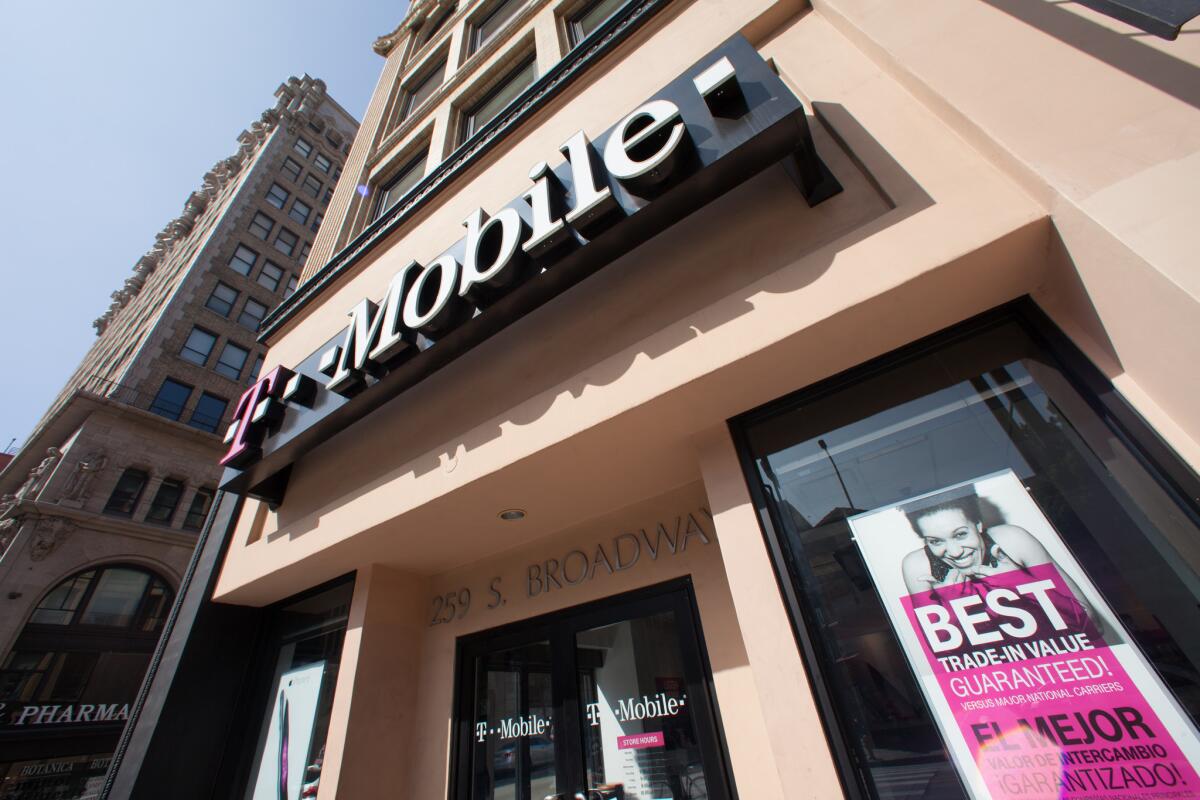T-Mobile-Sprint deal nears FCC approval, but states are still suing

- Share via
T-Mobile US Inc.’s proposed purchase of Sprint Corp. moved to a vote at the Federal Communications Commission, a step forward for the $26.5-billion deal that also calls on satellite-TV provider Dish Network Corp. to step up as a new wireless competitor.
FCC Chairman Ajit Pai asked colleagues to vote on the transaction, beginning a period of closed-door deliberations that could last into late September. Pai voted for the deal, and the two junior Republicans on the five-member agency earlier expressed support, so approval is expected. Federal antitrust regulators cleared the deal July 26.
On Wednesday, Pai shared with colleagues the draft of an order that would approve the merger, according to a news release. As he did so, the chairman voted for the deal, said FCC spokesman Neil Grace.
Pai didn’t release the order publicly, but it contains a provision that would extend next year’s use-or-lose deadline for a trove of airwaves Dish has amassed over the years, according to a person familiar with the document. If the merger fails, Dish wouldn’t get the extension.
In July, Dish offered to build a wireless network and asked the FCC for the extension. That same month, Dish Chairman Charlie Ergen discussed the possibility of not getting extra time, telling investors “we’d have time to start back up” with a less extensive network designed to satisfy regulators that the frequencies aren’t being held idle.
Pai’s action “brings us one step closer to formally aligning our goal of building the nation’s first standalone 5G broadband network with the FCC’s goal of rapid 5G deployment nationwide,” Jeff Blum, senior vice president at Dish, said in an email.
According to the FCC’s Wednesday news release, Dish’s plans are in the public interest — a term that signals approval is forthcoming. That would extend Dish’s deadline for using the airwaves by three years as it integrates Sprint’s Boost discount brand.
The merger faces a lawsuit from states that say it will raise prices by eliminating a national carrier and reducing competition.
On Wednesday, FCC Democratic Commissioner Jessica Rosenworcel indicated she was “not convinced” of the deal’s merits, saying in an email that “we need more competition, not less.” Opposition from minority Democrats can slow but not stop the deal, Bloomberg Intelligence analyst Matthew Schettenhelm said in a note. The Democrats can delay a vote until Sept. 25, but they may agree to move ahead before then, he said.
T-Mobile and Sprint are legally free to close their deal once they have FCC approval, but it’s not clear they would do so given the state litigation, Bloomberg Intelligence analyst Jennifer Rie said in an Aug. 2 note. A trial in the case is set for December.
The transaction, which was proposed last year, would combine the third- and fourth-largest nationwide mobile providers into a single rival to the established leaders, AT&T Inc. and Verizon Communications Inc.
Supporters say the combined company could quickly build an advanced 5G network, a priority of President Trump’s administration. Critics have focused on losing Sprint as a separate force. To create an additional competitor, T-Mobile agreed to provide airwaves and discount brands such as Boost to Dish to help the satellite-TV company become a new, nationwide wireless provider.
“This transaction will bring fast 5G wireless service to many more Americans and help close the digital divide in rural areas,” Pai said in the news release. The term 5G refers to fast next-generation wireless service, and the digital divide refers to poor broadband coverage outside metropolitan areas.
The Justice Department, which cleared the merger last month, called the FCC’s action an “important milestone.”
“We are now one step closer to strengthening competition for high-quality 5G networks that will benefit American consumers nationwide,” Asst. Atty. Gen. Makan Delrahim of the antitrust division said in a statement.
More to Read
Inside the business of entertainment
The Wide Shot brings you news, analysis and insights on everything from streaming wars to production — and what it all means for the future.
You may occasionally receive promotional content from the Los Angeles Times.










